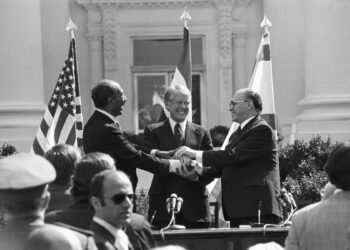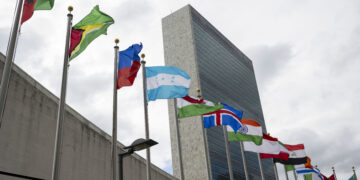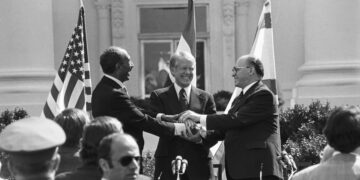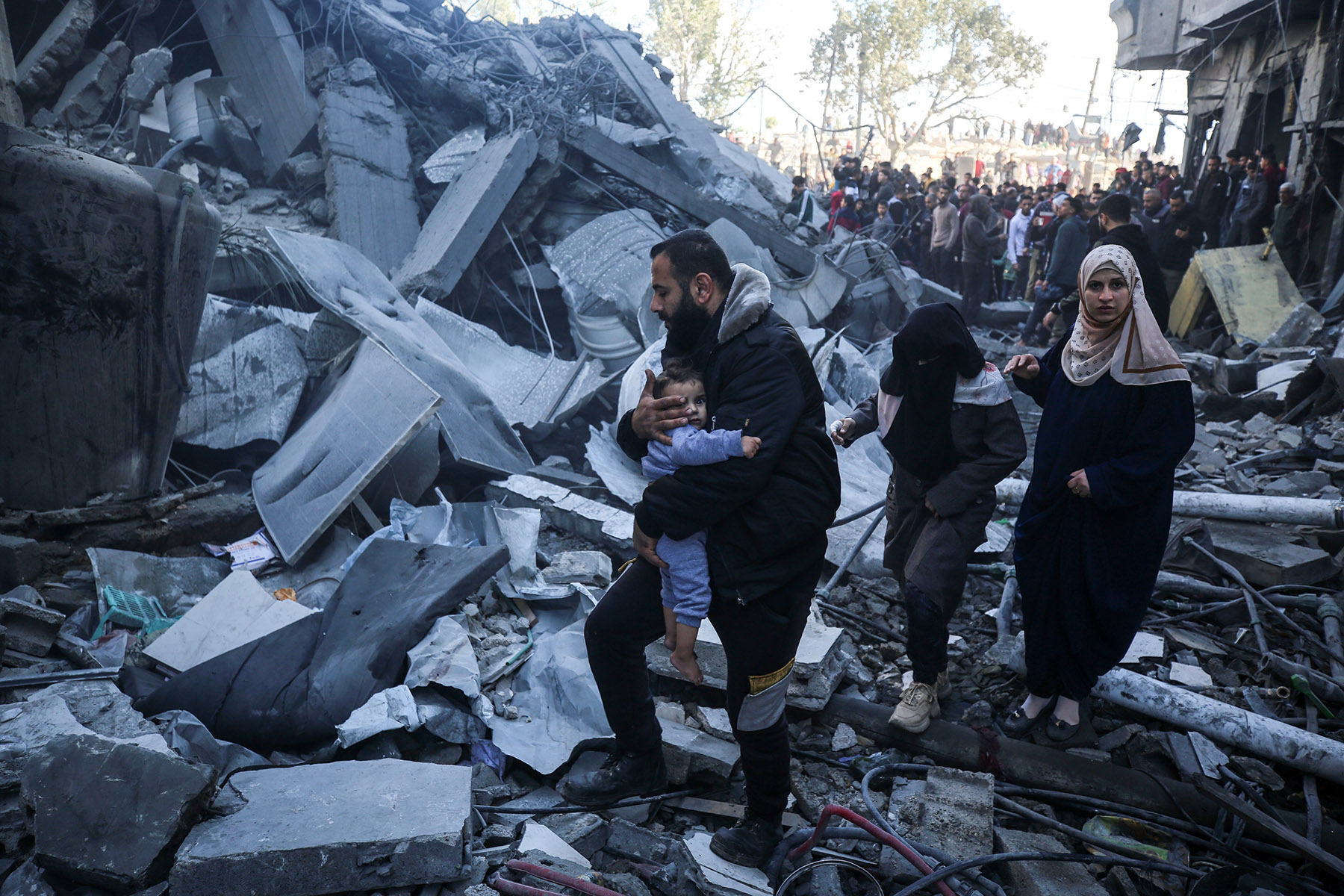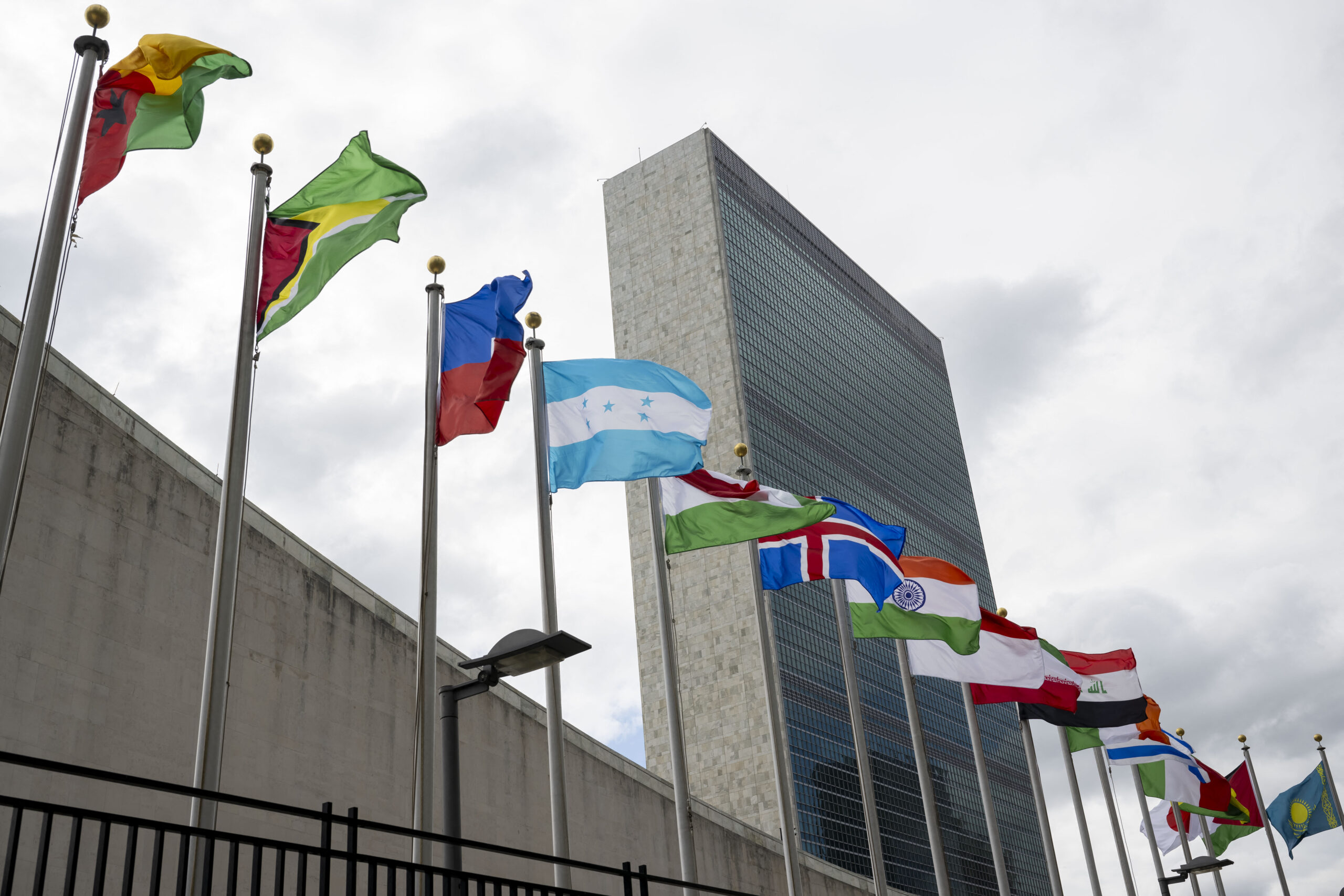Ambassador Frederic C. Hof is a senior fellow at Bard College’s Center for Civic Engagement. He is the author of Reaching for the Heights: The Inside Story of a Secret Attempt to Reach a Syrian-Israeli Peace.
In early December, U.S. Secretary of Defense Lloyd Austin warned that Israel risked "strategic defeat" in Gaza given how it was waging its war. "The lesson is not that you can win in urban warfare by protecting civilians. The lesson is that you can only win in urban warfare by protecting civilians," he told an audience at the Reagan National Defense Forum in Simi Valley, California. "In this kind of a fight, the center of gravity is the civilian population. And if you drive them into the arms of the enemy, you replace a tactical victory with a strategic defeat. So I have repeatedly made clear to Israel's leaders that protecting Palestinian civilians in Gaza is both a moral responsibility and a strategic imperative."
Austin's words are the essence of the argument he made to Israeli political and military leaders during his recent visit to Israel. Those Israeli ears upon which the words fell were not deaf. But they were, without a doubt, disbelieving. Israel, certainly under its current government (and perhaps under any government), does not see Palestinian civilians as a population to be protected and won over. Rather, it sees them as a hostile population to be deterred, discouraged and occasionally beaten into submission.
Austin's view of the nature of the war in Gaza and the key to victory for Israel against Hamas rests on the assumption that this conflict is, strictly speaking, between Israel and Hamas, and one in which victory is defined as capturing the support of the populace. Indeed, his identification of the civilian population—as opposed to a body count of enemy fighters—as the "center of gravity" is consistent with what British Gen. Sir Rupert Smith, in his book The Utility of Force, cites as the key to victory in the predominant form of warfare since 1945: "war amongst the people." In the Vietnam War, for example, the U.S. won nearly every battle and yet suffered a strategic defeat. In the end, the U.S.—and the corruptly ineffective Saigon government it backed—failed to win over the South Vietnamese people, in part due to heavy civilian casualties, thus rendering irrelevant the results on the battlefield. Afghanistan provides another more recent example, both for the Soviet Union and the U.S.
Clearly, however, Israel does not see the fight in Gaza as a "war amongst the people." Soon after Israel launched its military assault in response to Hamas's attack into southern Israel on Oct. 7, Israeli President Isaac Herzog suggested publicly that there were no innocent Palestinian civilians in Gaza. "It is an entire nation out there that is responsible" for Hamas's rule, Herzog said. "It is not true this rhetoric about civilians not being aware, not involved. It's absolutely not true. They could have risen up."
Israel, certainly under its current government (and perhaps under any government), does not see Palestinian civilians as a population to be protected and won over.
- Frederic C. Hof
Instead, from the Israeli perspective, this war is but the latest episode of a century-long war between the peoples. This version of reality sees nearly all Palestinians as unalterably opposed to the Zionist project, both within Israel and in the Palestinian territories occupied since 1967. Palestinian civilians, in this Israeli view, may indeed be part of the military center of gravity. But they are not, to be sure, seen as a prize to be won. They are quite literally considered unwinnable.
There was a time, in what now seems like antiquity, when it appeared that the Palestinian-Israeli war between the peoples might be replaced by cooperation and compromise. But the promise of Oslo in 1993 was destroyed by its opponents on both sides. Israelis expanded their settlements, and Jewish extremists murdered Palestinians and Prime Minister Yitzhak Rabin. Then, in 1996, Israel elected as prime minister an enemy of the Oslo Accords, Benjamin Netanyahu, who serves as prime minister today. At the same time, Hamas, eager to undermine Palestinian adherents to Oslo and destroy the prospect of peace, launched a terror campaign aimed at slaughtering Israeli Jews, as it did again three months ago, on Oct. 7. The Sharm el-Sheikh Fact-Finding Committee, of which I was chief of staff, tried to resurrect Oslo in 2000 and 2001. But settlements, violence and an indifferent new American administration in Washington under George W. Bush undermined that effort. What was resurrected instead was war between the peoples.
It is understandable and even admirable that Lloyd Austin would try to persuade Israel's political and military leaders that modern warfare aims not for vengeance but to achieve an overarching political objective, and that the center of gravity—the definition of victory—is capturing the will of the people residing on or near the battlefield. Austin is telling Israelis, in effect, that their scorched-earth military campaign in Gaza's urban landscape, which has now killed more than 23,000 Palestinians, most of them civilians, is alienating Palestinians and Arabs everywhere. He is hoping to convince Israelis that they can—and ideally will—still bring the perpetrators of Oct. 7 to full accountability. But by killing roughly 1 percent of Gaza's entire population, Israel is in grave danger of losing strategically, by inadvertently helping Hamas's ideology win the war for the minds and the will of Palestinian civilians. Indeed, Austin suggested, Hamas may win the war for the minds and will of millions of Arabs throughout the region.
No doubt key Israelis nod their heads, reiterate their adherence to the laws of war, blame Hamas for using civilians as shields, and promise to let more humanitarian aid flow into Gaza. But Israeli leaders are not about to see Palestinian "hearts and minds" as prizes to be won. To paraphrase something heard occasionally in connection with the Vietnam War, "Grab them by their throats. Their hearts and minds will follow."
Most Israelis simply do not see the price being borne by Palestinian civilians in Gaza as too high, given their view that the Israel Defense Forces should do whatever it takes to find and kill the perpetrators of Oct. 7 and prevent such an attack from ever happening again. Indeed, most Israelis agree with President Herzog's claim that those civilians are "responsible" for Hamas's grip on the Gaza Strip. And just as most Israelis do not see, let alone mourn, the civilian suffering in Gaza, how many Palestinians mourned the savagery inflicted on Israeli Jews by Hamas on Oct. 7? The consequence of each side seeing itself as the righteous victim of the other is mutual dehumanization.
Hamas will likely win the war for the Palestinian population, in perhaps all the occupied territories, for the simple reason that it is unopposed. Both it and its key external backer, Iran, are grateful for the humanitarian horror that has unfolded in Gaza under Israel's military campaign. Both appreciate the gratuitous bonus of Israeli Cabinet ministers who have called to forcibly displace Palestinians from Gaza and encouraged more settler violence in the West Bank, further undermining an already pathetic Palestinian Authority opposed to Hamas. And the inflammatory statements of Israeli officials—that Israel is "fighting human animals" in Gaza, that Gaza should be "razed" and "erased"—now being recited by South African lawyers at the International Court of Justice in The Hague to try to bolster an otherwise problematic case claiming that the Gaza abomination results from Israeli actions that are genocidal.
Too many Israelis and Palestinians have convinced themselves that their dispute boils down to a perpetual war between the peoples over who rules the land between the Mediterranean Sea and the Jordan River.
- Frederic C. Hof
Do Israelis worry about Arab reactions anywhere to any of this? Would the prospect of the collapse of the Abraham Accords and even peace treaties with Egypt and Jordan lead most Israelis to conclude that the political, if not the humanitarian, price for its war in Gaza is just too high? That a cease-fire, accompanied by the release of hostages and Palestinian prisoners, is now all but mandatory? Probably not. The nature of the Oct. 7 atrocities by Hamas may have convinced many Israeli Jews, if not most, that they are indeed alone in the Middle East, that peace with Arabs is illusory.
The sad irony in all this is that Israel's most sincere, most reliable friends in the United States seem to care more about Israel's regional security interests than even Israel itself does. Secretary of State Antony Blinken will not convince his Israeli counterpart that an end to the fighting in Gaza is the prerequisite for Israel sustaining and expanding diplomatic and economic relations with Arab states. And even if President Joe Biden tells Netanyahu that the way Israel is waging war in Gaza is doing profound harm to American interests in the region and well beyond, Netanyahu's response would likely be didactic, dismissive and indifferent. In the past, American presidents going back to Dwight Eisenhower and George H.W. Bush found it necessary to pressure Israel publicly and even coercively when Israeli actions seriously contradicted American interests. Biden, notwithstanding complicated electoral considerations, may find himself obliged to do the same if private, friendly persuasion continues to fall short.
Lloyd Austin couldn't persuade Israel's leaders that they must win over the will of the Palestinian people. He and other officials in the Biden administration may succeed in securing some grudging, marginal concessions from Israel aimed at saving some innocent Palestinian lives in Gaza and toning down the international condemnation of its war. But too many Israelis and Palestinians have convinced themselves—largely thanks to the genocidal proclivities of Hamas and the relentless, illegal Jewish settlement of occupied territory—that their dispute boils down to a perpetual war between the peoples over who rules the land between the Mediterranean Sea and the Jordan River. U.S. interests and domestic politics appear to be along for a reckless, unending, destination-free ride, with American hands nowhere near the steering wheel.




















